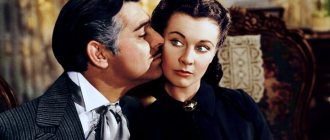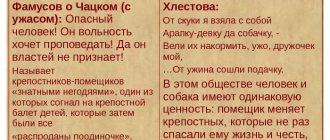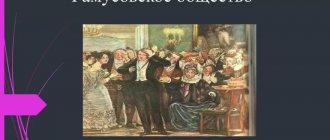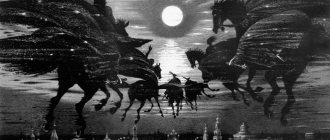Chatsky about foreignness (quotes)
1 answer
Chatsky: He stands for the development of national culture, for the unity of the intelligentsia with the people, and a high opinion of them.
Opposes blind slavish imitation of foreigners. And here from all sides there is melancholy, and groaning, and groaning. Oh! France! There is no better region in the world! – The two princesses, sisters, decided, repeating the Lesson that had been taught to them from childhood. Where can one go from the princesses? (Chatsky about the attitude of representatives of Famus society towards foreigners of the younger generation)
Rating: 4.2 (10 votes)
Conflict
In the work “Woe from Wit” the plot is based on two conflicts: the first is a love conflict, in which the main character Chatsky and Sophia participate, the second is a socio-ideological conflict, which again cannot do without Chatsky, the owner himself (Famusov) and his guests, defending outdated conservative views.
Getting to the topic “Famusov’s attitude to serfdom,” let’s first figure out what kind of person he is, what his priority is. Chatsky will become the main accuser of such pillars of noble society as Famusov, convinced serf owners who are ready to send their serf servants to Siberia for any mistake.
Do you know the answer?
Items
New questions
Site rating
- 1. Alexander S 941
- 2. Daniil Vasiliev 454
- 3. Daria Zavgorodnyaya 225
- 4. Igor Proskurenko 209
- 5. Karina Mirai 173
- 6. Isabella Bevz 136
- 7. Herodotus Abazbek 127
- 8. Vladimir Kuntin 106
- 9. Anton Kovalevich 98
- 10. Nastya Nikitina 95
- 1. Kristina Volosocheva 19.120
- 2. Ekaterina 18,721
- 3. Yulia Bronnikova 18,580
- 4. Darth Vader 17,856
- 5. Alina Saibel 16,787
- 6. Igor Proskurenko 15,939
- 7. Maria Nikolaevna 15,775
- 8. Larisa Samodurova 15,735
- 9. Liza 15,165
- 10. TorkMen 14,876
The most active participants of the week:
- 1. Victoria Neumann - bookstore gift card for 500 rubles.
- 2. Bulat Sadykov - bookstore gift card for 500 rubles.
- 3. Daria Volkova - bookstore gift card for 500 rubles.
Three lucky people who passed at least 1 test:
- 1. Natalya Starostina - bookstore gift card for 500 rubles.
- 2. Nikolay Z - bookstore gift card for 500 rubles.
- 3. David Melnikov - bookstore gift card for 500 rubles.
The cards are electronic (code), they will be sent in the coming days via VKontakte message or email.
Source
Famusov's image
Pavel Afanasyevich Famusov is the central figure of the play. Turning to the topic “Famusov’s attitude to serfdom,” it should be noted that he is a prominent representative of conservatives who adhere to the philosophical teachings of their ancestors. He calls them “fathers,” in turn, these are people who occupy high government positions and are wealthy landowners. They always advocate the preservation of autocracy and serfdom. They were never interested in issues of education and freedom. The image of Famusov is a collective image that represents the ruling class that has power over others.
The attitude of Chatsky and Famusov to ranks (quotes), to education, service
1 answer
Chatsky and Famusov, the heroes of the comedy “Woe from Wit” by A. S. Griboedov, are opposite heroes. Throughout the play, they express opposing views on the education of the younger generation, service, ranks, intelligence and love. Their opinions on each topic can be presented in the form of a table with quotes:
Attitude to service
“I would be glad to serve, but being served is sickening.” He wants to serve “the cause, the people.” He is disgusted to serve just for the sake of rank.
“And for me, no matter what it is, my custom is this: it’s signed, off your shoulders.”
He takes service lightly, serving only in order not to lose his place and to be significant in society.
“Ranks are given by people, but people can be deceived...”
“Uniform! one uniform! In their former life, he once covered, embroidered and beautiful, their weakness, their poverty of mind; And we follow them on a happy journey! And in wives and daughters there is the same passion for the uniform! ... "
Chatsky says that unworthy people often receive ranks.
“Be poor, but if he gets enough, two thousand family souls, he’s the groom.”
For Famusov, rank is everything. A person is judged not by his knowledge or merits, but by his place in society.
Attitude towards education
“Why, today, just like in ancient times, are they trying to recruit more teachers from regiments, at a cheaper price?”, “...we are ordered to recognize everyone as a historian and geographer.”
Chatsky notes that education does not give people knowledge - it exists only for fashion. That's why rich people hire teachers, but knowledge doesn't improve.
“They would take all the books and burn them,” “Learning is a plague, learning is the reason that now there are more crazy people, deeds, and opinions than ever before.”
For Famusov, education is the root of evil, so he believes that no one needs education.
Source
An essay on the topic of intelligence in the understanding of Chatsky and Famus society
Judgments are drawn from forgotten newspapers from the times of the Ochakovskys and the conquest of the Crimea... Chatsky despises braggarts who receive their “lire” not by serving the Motherland, but by flattering some individual person. Griboyedov wanted to show how difficult it is for a person whose thoughts and behavior differ from the opinions of the majority. It is likely that Famus society will exist all the time, because there will always be people who will be commanded by the upper classes. The comedy “Woe from Wit” made a huge contribution to the development of Russian literature and became an immortal treasure of people. We can say that Russian drama was born with this work. Very often in life we come across people who can be compared to Famus society. They are vile, stupid and untalented. What is the mind for them? And what does it really mean? These questions are resolved in the great work of Russian literature by A.S. Griboyedov “Woe from Wit”. This grief was for the main character of the comedy, Alexander Andreevich Chatsky, an intelligent, noble, honest and brave man. He hates and despises Famus society, in which the main theme in life is servility. He can be compared to a lone hero who fights an entire regiment. But his superiority was that he was unusually intelligent. Chatsky wanted to honestly serve his Motherland, but he did not want to serve higher ranks: “I would be glad to serve, but it’s sickening to be served.” These words of his indicate that before us is a proud, witty and eloquent man. In this work A.S. Griboedov shows the conflict between two opposing sides - Chatsky and Famusov society. Alexander Andreevich is a victim of his own wit. The people with whom he was surrounded did not understand him and did not even strive to do so. They are accustomed to living in eternal “slavery”; the concept of freedom is alien to them. It seems to me that Chatsky is not the only positive hero in this comedy; there are characters that Griboyedov only mentions in his work. This is Skalozub’s cousin, who left the service and went to the village, the nephew of Princess Tugoukhovskaya, Prince Fyodor, a chemist and botanist. They can be considered Chatsky's allies. It is simply unbearable for the main character to be in the company of people like Famusov, Skalozub, Molchalin. They considered themselves very smart, having earned their position by sycophancy. So Famusov confirms this in his own words: “Whether he’s honest or not, it’s all right for us, dinner is ready for everyone.” And also, talking about his late uncle, who knew when to help himself, he was proud that it was his relative who was so “smart.” People from Famus society did not notice how stupid their morals were. These people lived a fictitious life, without reflecting on the main thing - its meaning. Chatsky loved Sofia very much and admitted this to her at their first meeting after a long separation, and she answered him: “Why do I need you?” The main character begins to think that she has become the same as her father and those around him. Chatsky leaves Moscow, realizing that he has no place there. But Famus society cannot be considered a winner, since Chatsky did not lose this battle, he did not become like these people, did not sink to their level. It seems to me that this man was born a little earlier than the time in which it would have been easier for him to live. I believe that the comedy of A.S. Griboyedov’s “Woe from Wit” is a great work of Russian literature that is immortal. I read the magnificent comedy by A.S. Griboyedov “Woe from Wit”. It was created by the author over eight years. “Woe from Wit” is a comedy about how a crowd of fools do not understand one sane person. The events of the comedy develop in one Moscow aristocratic house over the course of one day. The main characters of this work are Chatsky, Famusov, his daughter Sofia and Famusov's secretary Molchalin. In the comedy there is a Famus society that opposes Chatsky. It lives with an opposing worldview, honoring and defending veneration and hypocrisy. Chatsky himself appears in Famus’s world like a cleansing thunderstorm. He is in every way the opposite of typical representatives of Famus society. If Molchalin, Famusov, Skalozub see the meaning of life in their well-being, then Chatsky dreams of selflessly serving his homeland, of bringing benefit to the people, whom he respects and considers “smart and cheerful.” So, in a conversation with Famusov, Skalozub utters the following phrase: ..Yes, to get rank, there are many channels. These people are deeply indifferent to the fate of their homeland and people. Their cultural and moral level can be judged by the following remarks from Famusov: “They would take all the books and burn them,” because “learning is the reason” that “there are crazy people, both in their deeds and in their opinions.” Chatsky has a different opinion - a man of extraordinary intelligence, brave, honest, sincere. He values people who are ready to “put their minds hungry for knowledge into science.” This is the only character that reflects many important personality traits of the author. Chatsky is a person to whom the author trusts his thoughts and views. Griboedov's hero has a lot of strength, he is eager to take action and is ready to prove his point. So, in a conversation with Famusov, Chatsky says: I would be glad to serve, but it’s sickening to be served. Chatsky is a representative of that part of the noble youth who rebels against the society of the Famusovs, the rock-toothed, silent ones. There are still a few such people, they are not yet able to fight the existing system, but they are appearing. That is why Chatsky can rightfully be called a hero of his time. It was they who had to carry out the first stage of the revolutionary liberation movement, shake up the country, and bring closer the time when the people would free themselves from the chains of slavery. If I were asked why I liked the comedy “Woe from Wit,” I would answer this way: “An interesting plot, bright characters, unique thoughts and statements had an emotional impact on me.” This work is one of those that, once you read it, you leave in your memory for a long time. The comedy “Woe from Wit” cannot be imagined without the author himself. Griboyedov and “Woe from Wit” - this is something without which neither one nor the other could exist alone. The very name of the comedy “Woe from Wit” suggests that the main character was not understood by the people around him. This hero, to whom the author paid more attention, is Chatsky. He is an intelligent, smart, honest, kind, sincere, brave, selfless, cheerful, progressive person. He is not afraid to express his point of view. He soberly assesses the situation and position of Famus society, not being afraid to express his opinion. Boldly entering into a conversation, he expresses his thoughts to the faces of his interlocutors. For example, the quote “The houses are new, but the prejudices are old” speaks of this person’s modern view of life in Russia. Chatsky's subtle and insightful mind does not accept Famus society, which he criticizes. The main character is disgusted to humiliate himself in front of people who are higher in the service and, perhaps, undeservedly occupy military posts, for example, Colonel Skalozub. Comparing Chatsky with the colonel, we can say that he is superior in mental development, thinking, and courage, which Skalozub does not have. I think that Skalozub, who holds such a position in the state, is not worthy to manage and command the regiments that were under his command. He would not be able to cope with his duty to the Fatherland, because he does not have the same merits as Chatsky. The person completely opposite to Chatsky is Molchalin. I have a special opinion about him. Even his last name speaks of meanness and flattery. He always takes advantage of the situation for himself. Molchalin is capable of betraying, deceiving, setting up, but at what cost?! Just to get a new position! Chatsky exposes Molchalin’s character and expresses his opinion: “But by the way, he will reach the well-known levels, because nowadays they love the dumb.” Speaking about the main representative of the Famusov society, Famusov himself, we can say that this man has a very high opinion of himself: “He is known for his monastic behavior.” In fact, he is an egoist; there is nothing interesting about him as a person. Even contrasting Chatsky with Famusov is impossible. Chatsky stands much higher and much more worthy than him. Chatsky is the winner, despite the fact that he was mistaken for a madman. He was forced to leave Moscow: “Get out of Moscow! I don’t go here anymore.” As a result, he was never able to achieve Famusov’s recognition and Sofia’s reciprocal love. Chatsky is an exponent of new ideas, and therefore society was unable to correctly understand him and accept him for who he is. His image in literature will live until the mind of mankind understands what ideas need to be fought for and defended. I read a wonderful comedy by A.S. Griboyedov “Woe from Wit”. This comedy makes fun of a stupid, stupid and vile society. It was written in 1824. In the comedy, the author depicts a true picture of the life of the Moscow nobility, which was in need of renewal. I would like to begin my essay with a quote characterizing the way of life of these nobles: In the love of traitors, in the enmity of tireless, Indomitable storytellers, Clumsy wise men, crafty simpletons, Sinister old women, old men, Decrepit over inventions, nonsense... Griboyedov describes the Moscow nobility, consisting of Famusovs, Zagoretskys, Skalozubs. They do not belong to high society. These are people who have never served at court. These are various talkers and swindlers like Zagoretsky, who are ready to humiliate themselves before the rich in order to get into their favor. This is Famus society. Wealth and nobility are the main requirement in it. The representative of this society is Famusov, who already has an adult daughter. Famusov’s ideal is his uncle: He fell painfully, but got up healthy. And about his attitude to the matter, he says this: ... It’s signed, so off your shoulders. Molchalin does not dare to object to his boss. He is quiet, timid, deceitful. Molchalin does not love Sofia, who does not know this. He cares because she likes it. Molchalin has no opinion. He pleases those on whom he depends. Skalozub is Famusov’s friend: And the golden bag, and aims to become a general. He seeks awards, waits for the moment when someone retires or is killed in the war. In the third act we get to know Famusov's other friends. This is Zagoretsky - a liar and a pleaser, Khlestova - an ignorant and grumpy old woman, the all-knowing Repetilov, Prince Tugoukhovsky, who is looking for rich and famous husbands for his daughters. The circle of concern of these people is lunches, dinners, searches for connections that will help them advance in their careers. For them, promotion can be obtained without any special merit: ..Yes, in order to get ranks, there are many channels... For the sake of rewards, they are ready to humiliate themselves, to be buffoons. Relationships in the Famusovs' world are based on fear and subordination to superiors. It doesn’t matter to them whether someone is smart or stupid: There is honor between father and son. The subject of conversation is gossip. The main task for parents is to successfully marry off their children. And in this insignificant society the noble, honest, educated, brave and witty Chatsky appears. Chatsky is the only positive hero in this comedy. He once lived in Famusov’s house and was friends with Sofia. Gradually his friendship grew into love, but then he left to wander. Now, three years later, he returns, full of hope. But Sofia no longer loves Chatsky and gives him a cold shoulder. She became completely different. She is cold and arrogant. Chatsky, trying to find out who Sofia’s chosen one is, comes into conflict with the entire Famus society. This society is afraid of Chatsky because he brings with him new views on life, new orders. But the Moscow nobility does not want to change anything and declares Chatsky crazy. Famusov is also afraid of Chatsky, because the main character is smart and sharp. He is distinguished by his independence of judgment and boldness of statements. He accuses Famus society of lies, slander, helpfulness, pretense, hypocrisy, stupidity, ignorance, for which society rejects him. At the end, Chatsky leaves. But who is he - the defeated or the winner? Chatsky is a winner because he is not alone! Somewhere there are others like him, and there are more of them every day. I really liked Griboyedov’s comedy, because the author, speaking in the role of Chatsky, is not afraid to accuse the Moscow nobility of lies and slander. I would like there to be no “woe from mind” in our society. Who is Chatsky and what kind of Famus society is this? The author compares and contrasts two categories of people who, even in our time, meet and conflict with each other. Griboedov's comedy, like the globe, has two poles. On one of them is Chatsky - an intelligent, brave, determined man. The author values intelligence in people and wants to show his main character as a person of the highest moral principles. Arriving in Moscow after a long absence, Alexander Andreevich is disappointed. He hopes to meet Sofia, whom he has loved since childhood. But when he comes to her house, he realizes that he is not welcome here. It is in this house that Chatsky encounters Famusov’s society: Famusov himself, Skalozub, Molchalin and other equally stupid, mediocre and insignificant people. Their main goal was to “earn” a high rank and have a place in high society. I'm not saying that Chatsky did not belong to high society, but he did not stoop to the level of Famusov and others like him. Alexander Andreevich remained a man of honor, he did not lose his dignity. Chatsky is trying to understand why he is worse than Molchalin, because he is a deceitful and vile person. Why did Sofia choose Molchalin over him? What did this vile man do to deserve her attention? The main character is afraid to even think that Sofia has become the same as her father. The entire Famus society is trying to destroy a person who is smarter than them. They spread gossip about Chatsky's madness. By this act, the entire Famus society showed its stupidity. Not a single person has refuted this claim. Chatsky understands very well that there is no place for him in Moscow, and he leaves. But this does not indicate that Famus’s society managed to break his pride and honor. On the contrary, Chatsky still remained superior to Famusov and his entourage. It seems to me that Chatsky is the most striking example for readers, that is, for you and me. By reading the comedy, we absorb into ourselves what the author wanted to teach, namely: honor, intelligence and human dignity. In the comedy “Woe from Wit” all the characters are divided into positive ones - Chatsky - and negative ones - Famusov and Famusov’s society. Griboyedov called Chatsky an advanced person, that is, a person whose image will live forever, and Famusov’s society - the face of all the nobles of that century (“the century of the past”). In the comedy, Famus society opposes Chatsky. After all, in this society, education and science cause special hatred. Griboyedov not only ridicules this society, but mercilessly condemns it. Famusov, as the main representative of this society, is an undeveloped person. Consequently, ignorance reigns in his house. Chatsky is the absolute opposite of Famusov. He is a thinking and feeling person. His actions speak about this. Chatsky, it seems to me, is very trusting of people. When he returns to Moscow, he, without going home, runs to his beloved. But he was late. Sofia, Famusov’s daughter, has changed, she doesn’t have that old love - that’s how Famusov’s upbringing worked. By this, Griboyedov shows Famusov’s selfishness. But as soon as Chatsky arrives, Famusov cordially welcomes him as a person of his own circle. He says: Well, you threw away the thing! I haven’t written two words for three years! And it suddenly burst out as if from the clouds. Famusov seems to want to show his friendship, which remains. However, it is not. Chatsky immediately runs to Sofia, but she is no longer the same. Despite this, Chatsky still loves her and immediately talks about her beauty. But in the end he finds out everything about her. For Griboyedov, knowledge is above all, and ignorance is below everything. And it is not for nothing that Griboedov shows the role of Chatsky and compares his intelligence with the ignorance of Famus society. There is a lot of negative things in Famusov, and his ignorance is confirmed by the words in a conversation with Liza about reading Sofia: Tell me that it’s not good for her to spoil her eyes, And reading is of no great use... Famusov’s society calls Chatsky bad and says that he has gone crazy mind. But what struck Chatsky? This is the fact that it was Sofia who started the gossip about Chatsky’s madness, and the whole society picked up: You’ll really go crazy from these, from boarding schools, schools, lyceums alone... And Chatsky needs to leave Famusov’s house. He is defeated, since Famus society turned out to be stronger than Chatsky. But in turn, he gave a good rebuff to the “past century.” The significance of the comedy “Woe from Wit” lies in the fact that the comedy vividly reflected the time when the struggle of the Decembrists against the oppressive landowners was intensifying. “Woe from Wit” is a realistic comedy. Griboyedov gave in it a true picture of Russian life. The comedy raised the topical social problems of those times: education, contempt for everything popular, worship of foreigners, education, service, ignorance of society. The main character of the comedy is Alexander Andreevich Chatsky. Witty, eloquent, he angrily ridicules the vices of the society that surrounds him. He differs sharply from those around him in his intelligence, abilities, and independence of judgment. The image of Chatsky is something new, bringing change. This hero is the expressor of the advanced ideas of his time. Famusian society is traditionally. His life positions are such that “it is necessary to study at the elders looking”, to destroy free thoughts, to serve with humility to the one who is a step above, to be rich. Famusov’s only passion is a passion for ranks and money. The beliefs of the Chatsky and Famusian society are different. Chatsky condemns serfdom, imitation of foreign, the lack of desire for education and their own opinion. The dialogs of Chatsky and Famusov are a struggle. At the beginning of the comedy, it is not so sharp. Famusov is even ready to give in to Sofia, but at the same time he sets the conditions: I would say, firstly: not the whims, namen, brother, do not manage vicearily, but, most importantly, serve, go. To which Chatsky replies: to serve, to serve, to serve as nauseous. But gradually the struggle turns into a battle. Chatsky argues with Famusov about the image and path of life. But the main character is alone in the fight against the views of Moscow society, in which he has no place. Molchalin and Skalozub are not the latest representatives of the Famus society. They are rivals and opponents of Chatsky. Molchalin is helpful, silent. He wants to please his humility, accuracy, flattery. Skalozub shows himself to be very important, business, significant. But under the uniform, he hides "poorly, reason to poverty." His thoughts are connected only with receiving the rank higher, money, power: yes, to get the ranks, there are many channels; I judge as a true philosopher about them: I would just go to the generals. Chatsky does not tolerate lies and falsehood. The language of this person is ocher, like a knife. Each of his characteristics is a label and caustic: Molchalin was so stupid before! .. The sorry creating! Is it wiser? .. And he - Khripun, a strangler, baskets, constellation of maneuvers and mazurka! Chatsky’s monologue “And who is the judges? ..” mercilessly condemns the Famus society. Each new face, appearing in the process of developing the plot, takes the side of Famusov. Gossip is growing like a “snowball”. And Chatsky does not stand it. He can no longer remain in the society of low, vile, arrogant and stupid people. They condemned him for the mind, for freedom of speech and thoughts, for honesty. Before leaving, Chatsky throws the whole Famusian society: you are right: he will come out of the fire, who will have time to stay with you, will take the air alone, and his mind will survive. Chatsky is higher than them, the best and rare qualities are manifested in it. Those who cannot see and evaluate this, the smallest, are just fools. Chatsky is immortal, and now this hero is relevant. The comedy “Woe from Wit” made a huge contribution to the development of Russian literature. The play of Griboedov was, is and will be a modern work until bureaucratization, a thirst for profit, gossip disappear from our life. The comedy was written on the eve of the Decembrist uprising in 1825. In the comedy “Woe from Wit”, Griboedov gave a true picture of Russian life after the Patriotic War of 1812. In a small in volume work, Griboedov depicted only one day in the Famusov’s house. In the comedy, we meet people who are equal by origin. These are nobles, but everyone has their own views on life. Their opinions contradict each other. A certain conflict arises between them, which is hidden from prying eyes. But in the comedy “Woe from Wit”, this conflict is clearly visible and not hidden - the clash of the “current century”, whose representative was Chatsky, with the “century past”, which represents Famusov and his environment. One of the most striking figures of comedy is Famusov. Famusov is an influential person occupying a significant place. In addition, he is a rich landowner. An important public position and a large estate create Famusov a strong position among Moscow Barry. He does not bother with work, spends time in idleness: ... magnificent buildings of the chambers, where they spill in feasts and motion ... He looks at the public service as a path to achieve wealth, ranks. He uses his official position for personal purposes. The enlightenment, the new progressive views of Famuses are looking at the source of “debauchery”. Learning considers evil: learning - this is the plague, scholarship - this is the reason that now it is more than when, crazy people, and deeds, and opinions. However, his daughter gives good education. Hospitality for Famusov is a means of maintaining relationships with useful people. Famusov is one of the most striking representatives of the Moscow Barrow. Other people are presented: Colonel Skalozub, Tugou princes, Countess Khumina. Griboedov satirically draws the Famus society. The heroes are ridiculous and disgusting, but not because the author did them like that, but because they are such in reality. Skalozub is a person aged and with money. Service for him is not the defense of the Fatherland, but the achievement of nobility and money. The world of Famusov consists not only of serfs, but also from their servants. Molchalin is an official depending on Famusian society. Molchalin was taught to please influential people. For his zeal, he received three awards. Molchalin is terrible that any kind can take: both the patriot and the lover. Despite the individual difference, all members of the Famusian society are a single social group. Chatsky, a person of advanced ideas, fiery feelings and high morality appears in this society. He belongs to the noble society, but in the image of thoughts he does not find like -minded people. In this society, Chatsky feels lonely. His views are rebuffed by others. Chatsky's most acute denunciations are directed against serfdom. It is serfdom that enables people of the Famus society to live robbery. Chatsky left the public service, since they demanded that he were sterea: he would be glad to serve, to serve as sick. He advocates true education, art, science. Chatsky against the upbringing that children in noble families give. He fought for freedom of thoughts, freedom of action. It seems to me that this is the main difference between Chatsky and the Famusian society, which did not recognize such morals. I think that such a great work will delight and surprise more than one generation. The ideological and compositional significance of the scene in the salon of Anna Pavlovna Sherer in the novel by L. N. Tolstoy “War and Peace” in significant works, as a rule, the first pages contain the grain of the whole plan. This can be said about * dead souls ”,“ crime and punishment ”,“ war and peace ”. L. Tolstoy himself said about the “crime and punishment” of Dostoevsky that “it was told and repeated that you have been read in the first chapters ...” In the “war and the world”, it would seem, the scene in the cabin, which opens the work, is by no means repeated. It’s just that we, as it were, plunged into the thick of events, immediately find ourselves among the heroes of the book, captured by a stream of life. But the meaning of the scene is not only this. In it, of course, although not as clearly as in the first episodes of Dostoevsky’s novel, all the main problems of the works are outlined, the very first words that sound in the cabin are reasoning about Napoleon, about wars, about the antichrist. In the future, this will be continued in Pierre’s attempt to kill Napoleon, in his calculations of the numerical meaning of the name of this “Antichrist”. The whole topic of the book is war and peace, the true greatness of man and false idols, divine and devilish. According to the arrangement of the characters, the scene resembles the play “Woe from Wit”. Pierre, who had just found himself in the St. Petersburg light, “like Chatsky from a ship to the ball”, into a society to which he is alien and to whom he does not understand at all. Like Chatsky, Pierre enters into unnecessary disputes, restores the whole society against himself, risking to earn a reputation as a madman. Among the Russian royalists who fled from Napoleon, Pierre's Russian courtyards proclaims that “the revolution was a great matter.” Like Chatsky, Pierre does not understand who he is “swinging beads”, and, in the words of Pushkin, we must admit that Pierre, like Chatsky, “is not a smart person, but Griboedov is very smart.” The intervention of Bolkonsky, fortunately, served to the cessation of the dispute, went out passions. However, in vain after admission to Sherer, Prince Andrei warns Pierre about his further behavior in the light. Pierre, alas, goes to the kuragin ... back to the interior of Anna Pavlovna. The main thing for us is to trace how the main lines of the heroes of the book are tied in this first scene. Pierre, of course, will become a Decembrist, this is understandable from his behavior from the first pages. V. Kuragin is a cunning, in some ways reminiscent of Famusov, but without his warmth and bloominess, outlined, however, Griboedov, not without sympathy ... The Petersburg public is still not Moscow basism. Vasily Kuragin is a prudent, cold rogue, although the prince, and in the future, will look for dexterous moves “to the cross, to the place”. Anatole, his son, whom he mentions in a conversation with Sherer, “restless fool”, will cause a lot of grief Rostov and Bolkonsky. Other children of Kuragin - Hippolytus and Helen - immoral destroyers of other people's destinies. Helen is already far from as harmless in this first scene as it might seem at first glance. There was still no shadow of coquetry in it, but it is completely aware of its beauty, “giving everyone the right to admire” ... a meaningful detail! Her smile is “unchanged” (the most terrible thing that can be in a person, according to Tolstoy, is his spiritual immobility), and Helen’s expression depends completely on the expression of Anna Pavlovna's face - Tolstoy emphasizes this specially. Three women in the salon, Sherer, Helen and Lisa, play the role of three parks, the goddesses of fate. M. Gasparov is interestingly compares the “spinning workshop” by the Sherer with the work of the goddesses, spinning the thread of the human fate. Another motive connecting the “war and the world” with antiquity is the ancient beauty of Helen. The same ancient beauty makes it like a soulless statue. The line Prince Andrei - Lisa wakes up the memories of the Homeric “Odyssey”. “So it is necessary,” says Bolkonsky, explaining the reasons for his close departure to the war. Lisa Volkonskaya, in contrast to Helen, lively and active, plays the role of Penelope (Prince Andrei in a conversation with Pierre emphasizes her loyalty and devotion), but some rock forces Bolkonsky-Odissey, which feels a deep gap with everything around him, to abruptly break off with the usual way and to meet the unknown and possible death. In general, of all the actors who appeared in the first stage, Bolkonsky is most mysterious and causes the greatest respect. The meaning of the scene of Anna Pavlovna echoes the epilogue of the book. In the epilogue, disputes about peace and war again arise, there is a little son of Prince Andrei, who was invisibly present in the Salon Sherer. The key point in the stage is the discussion of the words of Abbot Morio about the eternal world. Although the abbot no longer appeared on the pages of “War and Peace”, the main word was uttered, and the great book opens and ends with a dispute about the possibility of the eternal world. Such a project, of course, is ideally possible, the problem of the eternal world and dedicated his creation by Leo Tolstoy. Unrivaled, of course, since the same time as Christ came to earth, a project that can serve for the good of all humanity.
Famusov. Attitude towards service. "Woe from Wit"
Famusov, in the case of communication with an important person, will definitely point out family ties. “Let us be considered our own, even if we are distant, and do not divide the inheritance.”
When discussing the topic “Attitude towards Famusov’s service,” the quotes speak for themselves. The hero loves to surround himself with distant relatives and tries in every possible way to promote them in his career. He is not interested in whether a person can do this job or not. Here is an example, quote: “No! I crawl in front of my relatives, where I meet; I will find her at the bottom of the sea." Lisa says about Sophia’s father that he would like to have a son-in-law with ranks and stars - and no less. Famusov considers human learning to be a plague that causes eternal problems; he also believes that books are harmful and completely unnecessary; it would be better to burn them altogether.
Ranks and ranks
In fact, very much - Famusov. However, he has a special attitude towards service. As befits a real nobleman, he is at ease, but he does his work simply mechanically, with absolutely no interest in its meaning. The best confirmation of this are his words, in which he expresses the desire that a lot of things should not accumulate. Therefore, he often signs papers without reading them. As he himself says: “It’s signed, off your shoulders.”
For Famusov, service is not some kind of personally useful activity for him, and not even a means of earning money, and even more so he is not guided by the desire to serve the Fatherland. Service for him is the main attribute of a true nobleman. He treats ranks and tables of ranks with great reverence, and he evaluates people by them.
Characteristics of Famusov
He characterizes himself as an exemplary father, a cheerful, fresh, gray-haired man with behavior similar to that of a monk. But the people around Famusov speak differently. Daughter Sophia speaks very unflatteringly about her only parent: he is quick, restless and grumpy. And his obsessive desire for intimacy with the maid Lisa cancels out his “ascetic” behavior. They listen to his opinion and even value him. In general, Famusov is not an evil person, but now the most important and important issue for him is the search for a profitable match for Sophia.
Official man
Famusov himself is also not a poor man and has a fairly high rank of “government manager.” The success and career advancement of many people largely depends on it. He distributes awards and ranks, draws up patronages for young officials and pensions for retirees. It is quite understandable that people like Famusov will fight to the last to maintain their status and privileges. This hero praises Moscow traditions and morals. He believes that in everything we need to rely on the experience of our “fathers” and learn from the older generation.
Famusov’s quotes contain the meaning of “that there is honor between father and son,” even if he is poor, but if he has a couple of thousand serfs, then he will be considered worthy as a groom.
Excessive intelligence is a vice
Famusov, in his life beliefs, calls progressive young free-thinking a vice. He believes that this comes from an excess of intelligence and learning. He has a down-to-earth and worldly idea of the mind. According to his reasoning, the smart one is the one who was able to get a good job and make a career for himself at the expense of his patrons. For him, scholarship is the same as freethinking; in it he sees a huge danger for the entire society and the state. Famusov’s quotes in this case are simply amazing: “if evil is to be stopped, all the books would be taken away and burned.”







